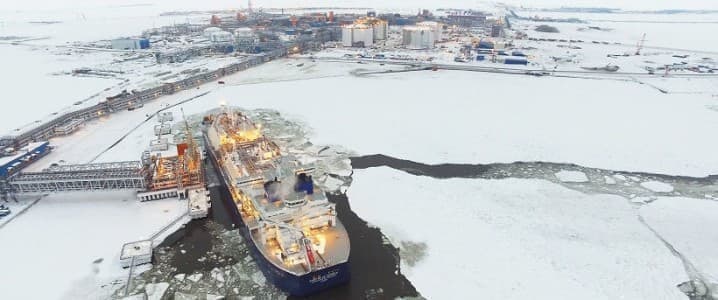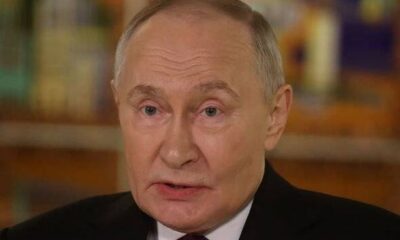Business
EU Struggles with Russian LNG Imports Despite Energy Sanctions

The European Union continues to import Russian liquefied natural gas (LNG) at an unprecedented rate, despite previous commitments to reduce dependence on Russian energy sources. According to U.S. Energy Secretary Chris Wright, the EU could potentially phase out all Russian natural gas purchases by January 2028, with the possibility of a quicker shift to U.S. LNG in as little as six months. This situation has raised concerns about the EU’s commitments versus its ongoing reliance on Russian energy.
In the first half of 2024, the value of LNG imported from Russia reached an all-time high of 4.4 billion euros (approximately $5.16 billion), an increase from 3.47 billion euros during the same period in 2023. This influx occurs despite the EU’s imposition of sanctions on the Russian energy sector and a stated intention to phase out imports. Analysts from Rystad Energy indicate that Russian LNG remains significantly cheaper than alternatives from the U.S., complicating the EU’s energy strategy.
The EU leadership has attempted to curtail imports from Russia, even discussing the possibility of terminating long-term contracts without incurring penalties. Nonetheless, these efforts have not halted the flow of Russian LNG. In fact, during the first half of 2024, the EU’s total LNG imports surged by 25%, with 55% of these shipments originating from the United States, while only 14% came from Russia. This positions the EU as the primary market for U.S. LNG, yet it paradoxically remains the largest buyer of Russian LNG as well.
Despite these complexities, EU Energy Commissioner Dan Jorgensen recently reaffirmed the bloc’s commitment to cease all Russian energy imports by January 2028. He emphasized the importance of balancing sanctions with price stability and security of supply, warning that an abrupt cut-off could lead to significant market disruptions.
The EU’s approach involves increasing imports from the U.S. and Qatar, alongside investing in renewable energy sources. However, challenges remain. Qatar, while a major supplier of LNG, faces compliance issues with the EU’s Corporate Sustainability Due Diligence Directive. This directive requires companies to address human rights and environmental impacts, with potential fines of up to 5% of annual global turnover for non-compliance. Qatar’s energy minister has openly stated that the financial implications could deter Qatari companies from entering the European market.
As the EU navigates these turbulent waters, it finds itself caught between the desire to reduce reliance on Russian energy, the need to maintain affordable energy prices, and the pressure to align with U.S. energy policies. This balancing act presents a significant challenge, as the EU seeks to avoid hypocrisy while securing a stable energy future.
The situation remains fluid, and the EU’s efforts to phase out Russian LNG imports will be closely monitored in the coming months. The ongoing dynamics highlight the complexities of global energy markets and the challenges faced by policymakers in a rapidly changing geopolitical landscape.
-

 World3 days ago
World3 days agoCoronation Street’s Shocking Murder Twist Reveals Family Secrets
-

 Entertainment4 months ago
Entertainment4 months agoKate Garraway Sells £2 Million Home Amid Financial Struggles
-

 Entertainment3 months ago
Entertainment3 months agoAnn Ming Reflects on ITV’s ‘I Fought the Law’ Drama
-

 Health3 months ago
Health3 months agoKatie Price Faces New Health Concerns After Cancer Symptoms Resurface
-

 Entertainment3 weeks ago
Entertainment3 weeks agoCoronation Street Fans React as Todd Faces Heartbreaking Choice
-

 World4 weeks ago
World4 weeks agoBailey Announces Heartbreaking Split from Rebecca After Reunion
-

 Entertainment6 days ago
Entertainment6 days agoTwo Stars Evicted from I’m A Celebrity Just Days Before Finale
-

 World6 days ago
World6 days agoKevin Sinfield Exceeds Fundraising Goal Ahead of Final Marathons
-

 Entertainment3 months ago
Entertainment3 months agoCoronation Street’s Carl Webster Faces Trouble with New Affairs
-

 Entertainment3 months ago
Entertainment3 months agoWhere is Tinder Swindler Simon Leviev? Latest Updates Revealed
-

 Entertainment4 months ago
Entertainment4 months agoMarkiplier Addresses AI Controversy During Livestream Response
-

 Science2 months ago
Science2 months agoBrian Cox Addresses Claims of Alien Probe in 3I/ATLAS Discovery





















